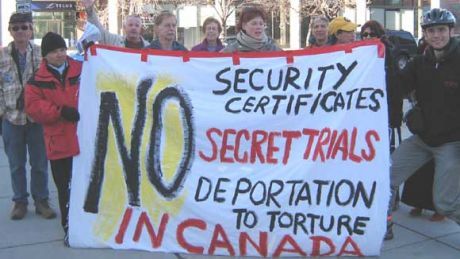Features
You are here
Security Certificates Struggle Continues Into Second Decade

July 4, 2012
By now, readers of Socialist Worker are likely familiar with the case of Mohamed Harkat, a former—very former—pizza delivery man and gas station attendant accused of having terrorist associations, although he has never charged with anything.
Any case that may exist against is him is not accessible to him or his lawyers; court-appointed Special Advocates are severely limited in what they can accomplish on his behalf because of the stacked rules governing the process.
Harkat is now in his second decade of fighting a security certificate which led, initially, to his detention in solitary confinement followed by several more years of detention, some at the notorious and badly run Kingston immigration Holding Centre—Guantanamo North—which was recently unceremoniously shut down.
A Federal Court of Appeal ruling has delivered a partial victory to Harkat and his family and multitude of supporters, in overturning a judge’s ruling that the destruction of original transcripts of conversation, summaries of which were used against Harkat, was an injustice. But this, like all other victories for Harkat, is a pyrrhic victory at best. Dozens of similar small victories have not yet led to freedom or justice for Mohamed Harkat—Moe to his friends. No matter how many errors, whether intentional or not, that CSIS and CBSA commit, Moe is still not free to live a normal life. That’s why he and his legal team are appealing to the Supreme Court to throw out all of the compromised evidence, not only those in which Harkat did not participate; and to declare the process unconstitutional, because the Special Advocates do not provide a solution to the Charter abrogation inherent in the process: the right to know the case against you.
Of course, the crown is also appealing, insisting on preventing even the Special Advocates from interrogating confidential informants, and on using summaries of conversations the transcripts and recordings of which have long since been destroyed by CSIS.
Meanwhile, this ruling is having an impact on another security certificate case: that of Egyptian refugee, Toronto resident and father of two, Mohammad Mahjoub. Mahjoub’s saga will be familiar to those who know security certificates, but is also in some ways worse.
Before he came to Canada, Mohammad Mahjoub was arrested, detained and tortured in Egypt. He was forced to complete military service and then told he would be arrested if he did not leave the country. He left. In Canada CSIS targeted him. He was threatened with deportation and endured religious insults.
When he was arrested in 2000 he was beaten by five guards and received death threats afterwards on a regular basis. In 2002 he was sexually assaulted by a guard, contracting hepatitis C. He did not receive proper health care and went on a hunger strike. He later staged hungers strikes to secure such basic necessities as eyeglasses.
In Guantanamo North, which he describes as a concentration camp, he again went on hunger strike. In 2007 he was released under house arrest and strict conditions; he was not allowed to leave his wife’s company, and could not be alone with anyone, including his children. On one occasion his wife’s privacy was invaded during a sensitive hospital procedure. After two years he voluntarily returned to Kingston, no longer able to justify placing his family under the conditions of his detention.
Mahjoub is now speaking out. His recent successful speaking tour was followed by a court ruling, based on the Harkat Federal Court of Appeal ruling, that excluded summaries of evidence in which the originals had been destroyed.
At the same time, 11 Crown lawyers have been permanently removed from his case for improperly accessing his solicitor-client privileged files. While this is significant, this shocking breach of privilege should have led to the case being tossed. Instead, the court is taking the Crown’s word for it that no one else will have been compromised by contact with the documents. The struggle continues.
Sign a statement against security certificates here.
Section:
Topics:
- Log in to post comments










